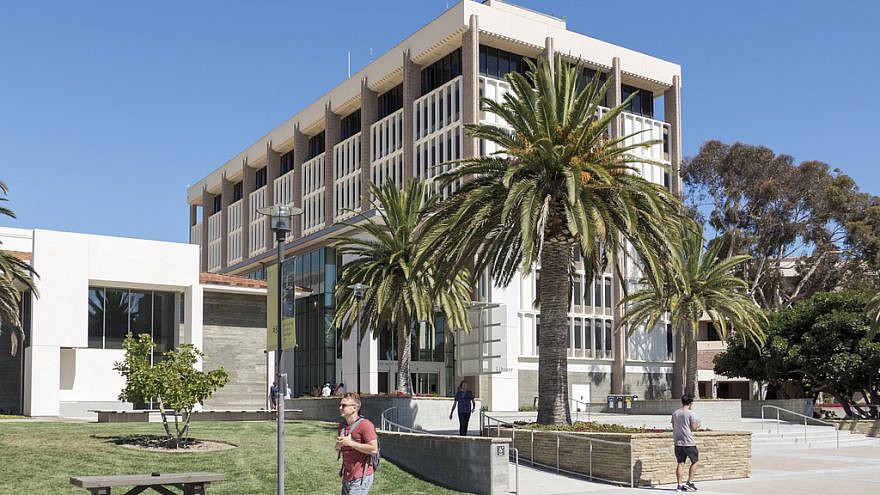The Algemeiner
Shiri Moshe
4/11/2019

Student leaders at the University of California, Santa Barbara rejected a divestment resolution targeting Israel on Thursday, marking the sixth time the measure failed to pass in recent years.
In a secret ballot vote of 14-10 and no abstentions, the Associated Students Senate shot down a proposal directing the university “to financially disassociate itself from companies that help commit human rights violations, by divesting from companies that participate in, or profit, from human rights violations in Israel/Palestine.”
The effort was spearheaded by the anti-Zionist group Students for Justice in Palestine (SJP) and debated during a hearing that began on Wednesday evening and exceeded 10 hours.
Divestment resolutions have been a nearly annual occurrence at UCSB since 2013, when the first failed by a margin of 12-11 with one abstention. Similar resolutions were defeated in 2014, 2015, and 2017, while one stopped short of coming to a vote last year following a procedural disagreement.
The campus remains the only one in the undergraduate UC system to have not adopted a resolution linked to the Palestinian-led boycott, divestment, and sanctions (BDS) campaign. The resolution’s student sponsors — Dylan Kupsh and Fatima Abdel-Gwad — insisted that it was not affiliated with BDS, which has been criticized by major Jewish groups in the US and abroad for rejecting the existence of a Jewish homeland in the Levant and promoting antisemitic narratives. Supporters of the campaign say it seeks to force Israel to abide by international law and correct the historic injustice of establishing a Jewish nation-state in territory claimed by Palestinians.
Yet multiple senators pointed out that the resolution’s very text invoked BDS measures that were passed on other campuses, as did opponents from Santa Barbara Hillel, Gauchos United for Israel, and Students Supporting Israel (SSI).
“They tried to make it seem as if it was simply a local issue of student funds,” Rabbi Evan Goodman, executive director of Santa Barbara Hillel, told The Algemeiner. “They clearly recognized that the International BDS movement was not something that would play well on our campus due to sensitivity about anti-Semitism throughout the world.”
The resolution was nonetheless “incredibly similar, if not identical to BDS resolutions passed at other universities in recent years,” Rachel Greenberg, co-president of SSI UCSB, pointed out in a statement.
She applauded UCSB for remaining “the last UC not to have passed this one-sided and ultimately antisemitic bill.”
Approximately 90 people were granted the opportunity to share their thoughts on divestment during the meeting, which felt “noticeably less aggressive than in years past,” though tensions still “ran high and speakers on both sides of the issue alluded to feelings of discomfort for various reasons,” Greenberg told The Algemeiner.
A student who identified herself only as Amit questioned the timing of the resolution, recalling that antisemitic flyers claiming “Jews worship the Devil” were found on cars and property around UCSB on March 31.
“Whether this is accidental or intentional, presenting this resolution only a few days after these outright antisemitic attacks does not show any solidarity with the Jewish and pro-Israel communities,” she said. “Passing this resolution would mean ignoring the voices of UCSB community members who insist that divestment is a threat and a promotion of antisemitism.”
Rabbi Goodman also alluded to the flyers in his comments, noting that he had “supported many Jewish students as they have been victims of antisemitism” in the past month.
BDS “does not offer any kind of positive solution,” but rather “imports the conflict by making our campus a hotbed of … black and white views,” cautioned Goodman, who taught a history of antisemitism class at UCSB last year. “It makes it unsafe for Jewish students, and toxic for other students as well.”
He pointed out that the resolution does not call for divestment from all defense companies, but only those with ties to Israel — a marker that it singles out the “one Jewish nation in the world.”
In a separate address, history student Jonathan Lebo, who attended previous divestment hearings, condemned the resolution for failing to address Palestinian violence against civilians, and described it as “an attack on Jewish students.”
“I honestly feel stripped right now, bare naked,” he told senators. “I feel every single year as a student, I have to justify my existence as a Jew, I have to justify my existence as a Zionist, and I feel that it’s unfair.”
Another student, identified as Christina, conversely described the resolution as a human rights priority and urged the Senate to “stop allowing the university to be complicit in the massacre and deaths of Palestinian people.”
“Israel is a base of US imperialism,” she said. “It mirrors the US in that Israel is also a settler-colonial project and therefore dependent on US government support.”
“This resolution is directed towards addressing problems of American imperialism and preventing many more deaths and violations of Palestinian human rights,” Christina added.
Kupsh, one of the two students who sponsored the resolution, argued that the university had to implement divestment before fair dialogue on the Israeli-Palestinian conflict could take place on campus.
“You have to be invested in neither side to be considered neutral,” she said.
After the final vote took place around 4:50 am, supporters of the resolution “quickly and quietly left the room,” Greenberg told The Algemeiner.
The night’s results were applauded by UCSB Hillel, which in a Thursday statement pledged to continue engaging campus leaders over the issue, and thanked partners including the Israel on Campus Coalition and StandWithUs for their support.
“As this has become an annual endeavor, we know we will unfortunately face similar campaigns in the future,” the Jewish group said. “[We] will continue to create a community that supports peace and honest dialogue and that works to make our campus, our community and our Jewish homeland safer and more peaceful.”
Read the article here.




